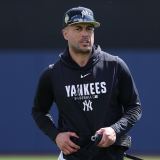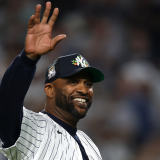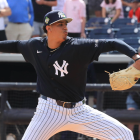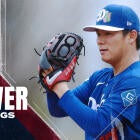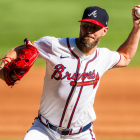2018 Baseball Hall of Fame Ballot: The cases for and against Johnny Damon
Is there any reason to vote for Damon?
The 2018 National Baseball Hall of Fame class will be announced on Jan. 24. In the days leading up to that announcement, we here at CBS Sports will profile one Hall of Fame candidate per day, provided that player is expected to receive the 5 percent of the vote necessary to remain on the ballot another year. Today's candidate: Johnny Damon.
This is Damon's first time on the ballot, following an 18-year career that saw him play for the Kansas City Royals, Oakland Athletics, Boston Red Sox, New York Yankees, Detroit Tigers, Tampa Bay Rays, and Cleveland Indians. Let's take a look at the cases for and against Damon.
The case for Damon
There isn't one.
Damon accumulated 2,769 hits over his 18 seasons, and was a solid or better player for much of that time. He finished with less than one Win Above Replacement twice -- in his first and last full seasons. Overall, he managed a 104 OPS+ and 56 WAR, both respectable marks.
Despite his best efforts to hang on and compile hits, Damon didn't pass any of the big-number thresholds that usually grant entrance. He did finish with more than 200 home runs and 400 stolen bases, however, joining a group of 10 others that includes Barry Bonds, Rickey Henderson, and Craig Biggio, as well as Bobby Abreu, Jimmy Rollins, and Marquis Grissom.
To Damon's credit, he did win two World Series rings -- one with the Red Sox and one with the Yankees. He also enjoyed a run of popularity in Boston that stemmed from his play, a caveman-like beard, and a willingness to call himself an idiot. He sacrificed much (if not all) of that good will later on, when he signed with the Yankees. Ah well.
The case against Damon
There are two ways into the Hall of Fame. One is to compile outstanding numbers over a long career, the other is to have a white-hot peak that atones for lacking durability.
Damon failed to do either.
Damon made just two All-Star teams in his career, and never won a major award. Heck, he never finished top-10 in MVP voting. He did lead the league in a few categories here and there: stolen bases in 2000; runs scored in 2000; triples in 2002; but that's about the extent of the black ink. He never finished with an OPS+ above 118 and, while defensive metrics are wholly unreliable, he only had one season in which he scored double-digit Defensive Runs Saved.
Going a little farther down the advanced metric road, Damon's seven-year peak saw him finish 12 wins short of the average Hall of Fame center fielder's peak -- and 15 wins short of their overall career. In other words, Damon was a solid player -- a consistently solid player -- but never the kind of transcendent talent who merits representation in Cooperstown.
Will he make it?
Not a chance. Damon doesn't have much working in his favor for enshrinement, and that's reflected in his poor showing to date. The reality is Damon could fall short of the five percent minimum that's required for him to remain on the ballot heading forward -- Ryan Thibodaux's Hall of Fame ballot tracker has him down at 1.2 percent. Even if Damon does hang around, he's never going to find enough support to land a plaque. Good career, fun guy, but not Hall-worthy.
Hall of Fame profiles: One-and-dones | Hideki Matsui | Omar Vizquel



